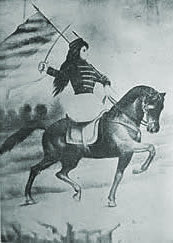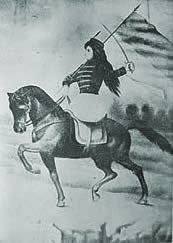
|
Women and Independence in Latin America An exploration of women's involvement in the Latin American Wars of Independence |

|

|
Women and Independence in Latin America An exploration of women's involvement in the Latin American Wars of Independence |

|
Click on the image below to see the full-size image
 Exile 1814 |
Gender:Female
Ethnic origen: White
Events:
| 1802 | - | Bogotá | - | Unknown | - | On 4th July she married Camilo Torres Tenorio who became President of the Congress in Colombia. |
| 1810 | - | Bogotá | - | Unknown | - | She hosted tertulias for patriots and was among a group of women who released the Viceroy and his wife from prison on 14 August 1810. |
| 1816 | - | Espinal | - | Unknown | - | She was made to walk into exile in Espinal by Morillo in August 1816. |
| 1821 | - | Bogotá | - | Unknown | - | Bolívar awarded her an annual pension in November 1821. |
Connections:
Alvarez family (Bogotá)Biography:
From Bogotá, she was part of the González Manrique, Alvarez, Ricaurte, París, Pardo, Nariño clan. (Monsalve, 139)
She married Camilo Torres on 4 July 1802. They hosted meetings for patriots around 1810. (Monsalve, 36)
Cousin of Manuela Sanz de Santamaría de González Manrique. (Monsalve, 89, 165) Mother of Martina Torres Prieto de Cárdenas, Eusebia Torres Prieto de Arboleda, Jerónimo Torres, Epifanio Torres and Juliana Torres. She was beautiful, kind, cultured, intelligent and educated. (Monsalve, 165-166, 174)
On 14 August 1810 she was among a group of women who insisted that the Viceroy and his wife, Francisca Villanova, be given safe conduct from the prisons in which they'd been held overnight and returned to the Viceroy's palace. (Monsalve, 94)
In August 1816 she was forced into exiled by Morillo with her children. She was probably held in the Cárcel Chiquita beforehand. They had to walk to the town of Espinal. (Monsalve, 161) Before Torres was executed, Prieto was in Espinal for health reasons. On 30 June (1816?) all the belongings she had with her were confiscated and she was made to return to Bogotá. Afterwards all of her possessions were taken (including household utensils and a thimble). (Monsalve, 159, 165)
In November 1821 Bolívar awarded her an annual pension of 1,000 pesos. He wrote, "la viuda del más respetable ciudadano de la antigua República de Nueva Granada, se halla reducida a una espantosa miseria, mientras yo gozo de trienta mil pesos de sueldo. Así he venido en ceder a la ciudadana Francisca Prieto mil pesos anuales de los que a mí me corresponden. En consecuencia, sirvase Vuestra Excelencia ordenar se le satisfaca la mensualidad correspondiente, descontándoseme a mí. Dios guarde a Vuestra Excelencia muchos años. Bolívar, Cuartel General en Bogotá a 6 de noviembre de 1821." (Monsalve, 167)
References:
Davies, Catherine, Brewster, Claire and Owen, Hilary (2006) South American Independence. Gender, Politics, Text
Forero, Manuel José (1970) Grandes heroinas de Colombia, Doña Magdalena Ortega de Nariño, La Precursora
Monsalve, José D (1926) Mujeres de la independencia